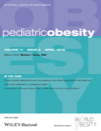Public Supports Action to Protect Youth From Weight-Based Bullying
/Parental support for enactment of laws and policies to protect youth from weight-based bullying is “present, consistent, and strong,” according to a new study by the Rudd Center for Food Policy and Obesity at the University of Connecticut.
All 50 states currently have anti-bullying laws, but only three states – New York, Maine and New Hampshire - include body weight as a characteristic that places youth at risk of being bullied.
Many school districts have anti-bullying policies, yet body weight is often overlooked, stating that “evidence from students, parents and teachers indicates that weight-based bullying is one of the most prevalent forms of peer harassment towards youth in the school setting.”
The study found that support for including weight-based bullying in anti-bullying laws has grown during the past two years, stressing that “the omission of body weight in existing policies has important implications for youth who face weight-based bullying.”
 “Parental voices can be influential in mobilizing advocacy efforts, and enacting policy change affecting children’s health,” said Rebecca Puhl, a study author, professor in UConn’s Department of Human Development and Family Studies, and deputy director of the Rudd Center.
“Parental voices can be influential in mobilizing advocacy efforts, and enacting policy change affecting children’s health,” said Rebecca Puhl, a study author, professor in UConn’s Department of Human Development and Family Studies, and deputy director of the Rudd Center.
The study findings, published in the journal Pediatric Obesity, can inform policy discussions about remedies for weight-based bullying among youth as increasing national attention is being paid to this issue. The study indicated that “parental support is an influential catalyst motivating political will for policy decisions affecting youth, but has received limited research attention.”
Specific findings of the study include:
- Parental support has been consistently high (at least 81 percent) over the past two years for policies to address weight-based bullying among youth at the school, state, and federal levels.
- Support appears to have increased over the past two years for measures to better protect youth from weight-based bullying through improvements to state anti-bullying laws (87.9 percent – up from 84.7 percent) and through enactment of federal legislation (86 percent – up from 81 percent).

- While previous research has shown that mothers express more support than fathers for similar types of policies, this new study found no gender difference, suggesting that fathers’ support for these measures may be increasing.
“As a next step, it will be important to communicate with policy makers and school officials to identify interest and feasibility of viable policy initiatives,” said Puhl, “and to examine potential avenues for enacting change through law.” Puhl told CT by the Numbers that Connecticut’s law includes “physical appearance” but not body weight. There is, therefore, room to strengthen the state law, she pointed out, because physical appearance is a broad category that can include everything from clothing style to hair color, and body weight could easily slip through the cracks if it is not specifically enumerated.
The study involved online questionnaires of diverse national samples of parents in 2014 and 2015, totaling 1,804 parents over the two years. The research was funded by a donation from Rudd Foundation and a grant from the Robert Wood Johnson Foundation.
The study co-authors include Young Suh and Xun Li of the UConn Rudd Center. The Rudd Center for Food Policy & Obesity is a non-profit research and public policy organization devoted to promoting solutions to childhood obesity, poor diet, and weight bias through research and policy.






























